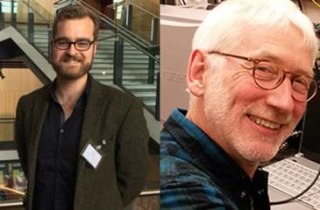Sep 29 2015
Two Bristol academics are among the recipients of a Quantum Technology Fellowship, funded by the Engineering and Physical Sciences Research Council (EPSRC) to support the UK’s activities as a world leader in quantum science and technologies.
 Dr Jonathan Matthews (left); Professor John Rarity
Dr Jonathan Matthews (left); Professor John Rarity
The 10 new Fellowships represent a £12 million investment in key researchers, and form part of the government’s £270 million National Quantum Technologies Programme.
The Fellowships are aimed at early and established career-stage academics whose research focuses on the direct exploitation of quantum phenomena, such as superposition or entanglement, to address the challenges of translation of quantum science through technology to eventual application. They will support both the individuals and their teams.
The Bristol recipients and their funded projects are as follows.
In the Established Career category, John Rarity, Professor of Optical Communication Systems, becomes a Quantum Technology Fellow for his project entitled ‘Spin-photon systems for scalable quantum processors’:
It has long been known that light behaves as both wave and particle. For instance in interactions with atoms, single particles of light (photons) can be absorbed or emitted. However, the scattering of light by atom-like emitters can lead to photon-like and wave-like effects in the same experiment. This project will enhance and exploit this behaviour using single atom-like light emitters embedded in wavelength scale optical cavities to make ultra-low power optical switches. The wave/particle duality will also allow researchers to make the fundamental gates and memory elements required to build a quantum computer, or repeaters for quantum communications over long distances.
In the Early Career category, Dr Jonathan Matthews, Lecturer in the School of Physics, becomes a Quantum Technology Fellow for his project entitled ‘Photonic Quantum-Enhanced Sensors’:
Harnessing quantum states of light will overhaul the way we measure physical parameters and quantify our environment. This fellowship aims to use the scalability and manufacturability of integrated photonics to realise revolutionary quantum enhanced approaches to sensing. This will enable capabilities beyond the state of the art and beyond the limits of classical physics for a range of measurement systems, including spectroscopy and interferometry.